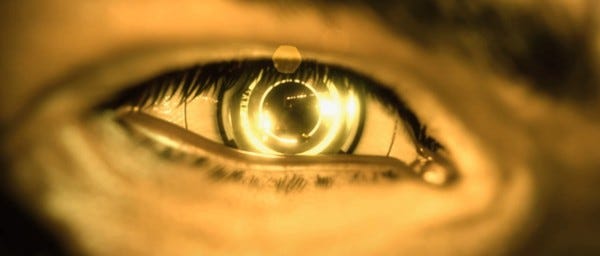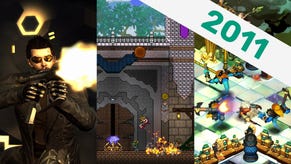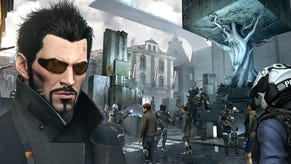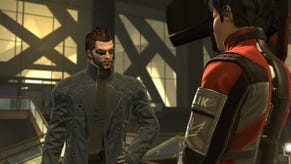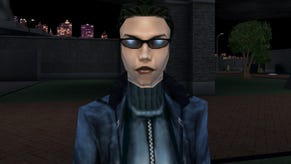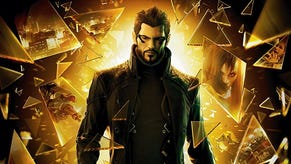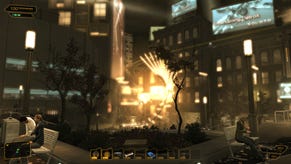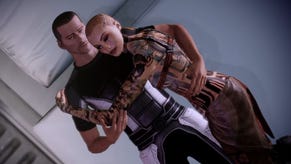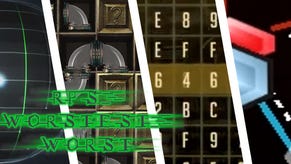DX3: "We Didn't Want To Go Black & White"
Mary DeMarle is the Narrative Designer and Lead Writer for Deus Ex: Human Revolution, an IMPOSSIBLY EXCITING game which we've just offered our first hands-on impressions of here. In the following interview she answers my questions on how she was working to make her characters human, how the conversation battles would work and whether the game is, in fact, a love story. Yeah, a love story. You read that right.
RPS: I’ve heard a lot of talk about Human Revolution having themes of humanity, asking what makes us human and so forth, which I imagine would require a cast that seems quite human in the first place. What steps have you taken to make the cast believable?
Mary DeMarle: Well, we didn’t want to go black and white with anything, we wanted to have shades of grey in everybody and everything in the story. So when I approach character development I usually do it by starting with deciding what each character’s core personality traits are. I usually come up with 3 or 4, and try to pick traits which compliment each other, but also contradict each other, which I think makes for a more realistic character. Because we all have those inner conflicts, and sometimes certain traits take over.
So I start with that, and then I think about how those traits might manifest in real actions. So if you have a curious character, you might have a curious character who’s also quiet, so he sits in the background or the back seat of the bus and watches everybody. I think this way you create a character with a more realistic bent to them.
It’s also realising that even “evil” characters aren’t evil because of their intentions, but only their actions. You have to think about that person is motivated to do what he’s doing and build a backstory around that.
RPS: On the subject of evil, I was thinking that bad videogame writing often makes characters appear cardboard and inhuman. How can you capture inhumanity in a character without making them appear unbelievable?
MD: It is difficult, because you don’t want a cardboard villain. Sometimes what happens is the writer will create a character who isn’t like that, but do to the pressures of time and execution they end up losing the subtleties. And then they curse themselves.
But if you start by creating a rounded character whose message may be bad, but has a legitimate reason to feel that way, then that’s the starting point. I remember an interview with Ralph Fiennes on the subject of Schindler’s List, and he said that in order to play the villain in that film he needed to find something in that character that he really liked, because otherwise you’re just focusing on the evil. You have to find the good in the character and rely on it.
RPS: Moving on a bit, I was really surprised at the prominence of the “I love you” line in the game’s intro. It’s not something you hear in games, even games that are love stories. Is it true to say that Jensen’s motivated by love? And in that case, would that make the game a love story?
MD: Wow! You’re getting me to talk about the good stuff. My personal view of Adam Jensen is that he’s definitely driven by love, but it’s not necessarily a romantic love per se. One of his strongest traits is loyalty, and I think that he’s loyal to things and it often screws him up in the end. So he does feel responsible for the deaths of all those people at Sarif Industries [Ed- Jensen is the head of security at Sarif], and it’s the sense of loyalty and figuring out where everything went wrong that motivates him as a character. It’s not so much a sense of “I need to get revenge”, as “I need to make it up to these people and figure out who’s really behind this”. But does that make it a love story? That’s interesting. I don’t know.
RPS: I’m interested that Jensen’s motivated by loyalty in a game world which has always boasted a higher than average share of conspiracies. Can we expect Jensen to have some tough decisions to make when, and I’m guessing here, it turns out that Jensen’s company is not all that it appears to be?
MD: I don’t want to give away too much, so I don’t think I’m going to answer you on that one.
RPS: But loyalty’s a big theme in the game?
MD: I would say so. But of course, the player can choose not to play him that way.
RPS: So, Jensen’s augmentations are really quite severe, and the introductory sequence that shows him receiving them sees him suffering through terrible pain. Are they a physical manifestation of the weight of his mistake?
MD: I know that from my standpoint with Jensen (and this gets complicated what with the player experience, and the player deciding for themselves what’s right and wrong), we definitely did start with Jensen as somebody who wasn’t sure yet if he wanted to get augmented or not. He hadn’t made the decision, and the fact that it’s taken from him in the beginning is a defining part of his character. He lost control at one point and now he can’t ever go back, and the only decision that’s left for him is to decide how he feels about [his augmentations].
RPS: How do you write a character who has all of his big decisions left up to the player? Is it just up to you to give him a starting point and let the player move onwards from there?
MD: Pretty much. We create a strong, defined personality and backstory, but the present and future are in flux. What we have to do from a writing standpoint is give the player his choice, and whatever he decides we make sure it’s executed in a “Jensen” way. So instead of being, I don’t know, this Duke Nukem asshole, he’s an Adam Jensen asshole.
RPS: Speaking of assholes, let’s talk about Frank Pritchard [Sarif’s resident computer expert and Jensen’s digital counterpart in keeping the company safe]. He’s pleasingly antagonistic- the character who held his role in the original Deus Ex, Alex Jacbonson, was perfectly lovely. What was the thinking in making your op com in Human Revolution dislikable?
MD: First of all, I’ll just confess that he’s my favourite character [laughs]. I love everything that he’s in. What we decided in terms of him specifically was that we wanted somebody who really emulated life. Because there are times in life when you have to work with somebody and you just don’t like them, but you still have to work with them, and we decided right from the start that that would be the case. Jensen and Pritchard do not get along, although at the end of the day they can still say “Look, I respect your professional integrity”. Although, I mean Pritchard would never say that. “I respect your professional capability, but you know what? You’re still a dick.”
RPS: I guess it immediately creates a nice back and forth, a sort of spark for you to write around. So, something unique about the original Deus Ex was how many characters it featured who lied to you, which is always difficult to do in a videogame as the player need to feel in control. Presumably you guys are doing that in places in Human Revolution. How hard is that to implement smoothly?
MD: It is hard. If a character’s going to lie about something important, you don’t want the player to fail at something else as a result, and all of these kinds of things. You have to at least put enough in there to hint to the player that the character might be lying to you. But at the same time, conspiracy and not knowing who to trust is integral to Deus Ex.
RPS: Moving on again, a nice feature you’ve been talking about in Human Revolution is the conversation duels the player will have with characters in the world, where the NPCs might choose to be ignoble, or reasonable, or something else selected at random from a small pool of responses. If random chance is involved in how a character responds to what you say to him, doesn’t that mean you have to abandon the concept of a solid character?
MD: No, it actually strengthens it. For each of the conversation battles you get into in the game the first thing we did was define the character and his personality traits, and each of his “attacks”, if you want to call them attacks, are all based on his personality. The random factor means he might act on his insecurity, or his bravado or something else, and the random factor only means that we don’t know which will come up at any given time.
RPS: Finally, with anti-augmentation groups featuring in Human Revolution, I was just wondering what your own opinions are on human augmentation and human bioengineering are.
MD: Oh, gosh. Well I have to tell you that the joke on the team is that for the duration of this story I’d be supporting the anti-technology view, because most people on the team wouldn’t be anti-technology, and it’d help me make the game more human, you know? And now that the project’s over I bought my first iPad, and I have to admit I’m suddenly like “You know, if I could get one of those InfoLinks in my head, it’d be really useful.”
But you know, all of this stuff is already out there. We already have people putting cameras in their eyes to improve their vision. The technology’s there, we’re just not aware of it. As far as our team’s technology expert is concerned, human augmentation’s been going on for decades. If you look at all the sports controversy regarding drugs, that is augmentation. It’s already happening.
RPS: But you have no qualms with our using technology to make ourselves more than we can be?
MD: From my perspective, I think mankind will always try to be more than he is. That’s part of being human. But I do admit we have to be careful about how we do it.
RPS: Thanks for your time.
